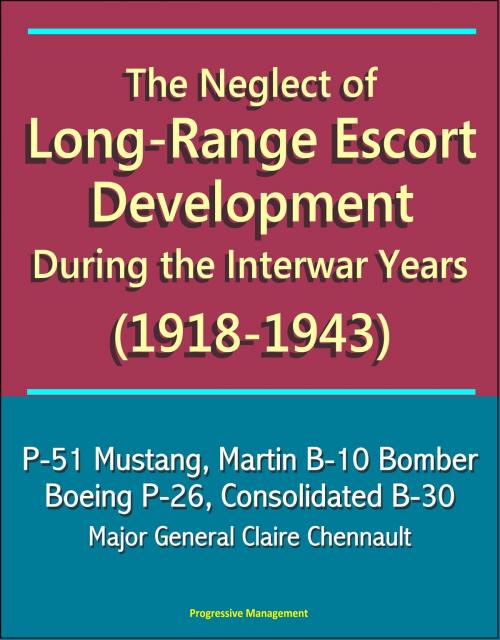The Neglect of Long-Range Escort Development During the Interwar Years (1918-1943) - P-51 Mustang, Martin B-10 Bomber, Boeing P-26, Consolidated B-30, Major General Claire Chennault
Nonfiction, History, Military, Aviation| Author: | Progressive Management | ISBN: | 9781310882944 |
| Publisher: | Progressive Management | Publication: | May 9, 2014 |
| Imprint: | Smashwords Edition | Language: | English |
| Author: | Progressive Management |
| ISBN: | 9781310882944 |
| Publisher: | Progressive Management |
| Publication: | May 9, 2014 |
| Imprint: | Smashwords Edition |
| Language: | English |
This project is part of a series of Air Command and Staff College research papers that discuss the development of American air power doctrine prior to World War II. This paper discusses the relationship between the development of air power doctrine and the development of long-range escorts for strategic bombardment in World War II.
INTRODUCTION * Thesis Statement * Scope * THE STRUGGLE FOR AIR POWER IN THE 1920s * Pursuit Aviation Dominance * The Struggle to Fund Air Power * Army Versus Navy * Research and Development * BOMBARDMENT DOMINANCE IN THE 1930s * Bomber Dominance * The Effects of Depression Era Budgets * Multi-Seat Versus Single Seat Pursuit * THE ESCORT CRISIS ENTERING WWII * Need for Long-Range Escort Realized * Solutions to Escort Problem * Multi-Seat Fighters Fail Again * Drop Tanks * P-51 Mustang * CONCLUSIONS * Air Power Doctrine * The Influence of Budget
America's lack of effective long-range escort for strategic bombardment was the Army Air Force's worst failure of World War II. The basic cause for peacetime negligence of long-range escort development was that air power decisions were influenced more by budget considerations and less by sound doctrine. This historical study uses a chronological approach to describe the evolution of long-range fighter escort. Air power doctrine was driven by technical advances and consisted of untried theories. The advent of the all metal mono-plane gave credibility to the emerging doctrine of strategic bombardment. The Air Corps became polarized between bomber and pursuit advocates, where the dominate doctrine of employing self-protecting bomber formations devalued the role of long-range escort.
Money was viewed as the critical ingredient for building air power while doctrine was secondary. The desire to attain air power during an era of constrained budgets produced unhealthy competition between the Army and Navy. Restrictive budgets also required prioritization of research and development and production programs. Several efforts failed to produce multi-purpose aircraft that would also fulfill the escort role. The Spanish Civil War experience proved the need for long-range escort. This late realization prompted the programs that eventually produced an effective long-range escort.
This project is part of a series of Air Command and Staff College research papers that discuss the development of American air power doctrine prior to World War II. This paper discusses the relationship between the development of air power doctrine and the development of long-range escorts for strategic bombardment in World War II.
INTRODUCTION * Thesis Statement * Scope * THE STRUGGLE FOR AIR POWER IN THE 1920s * Pursuit Aviation Dominance * The Struggle to Fund Air Power * Army Versus Navy * Research and Development * BOMBARDMENT DOMINANCE IN THE 1930s * Bomber Dominance * The Effects of Depression Era Budgets * Multi-Seat Versus Single Seat Pursuit * THE ESCORT CRISIS ENTERING WWII * Need for Long-Range Escort Realized * Solutions to Escort Problem * Multi-Seat Fighters Fail Again * Drop Tanks * P-51 Mustang * CONCLUSIONS * Air Power Doctrine * The Influence of Budget
America's lack of effective long-range escort for strategic bombardment was the Army Air Force's worst failure of World War II. The basic cause for peacetime negligence of long-range escort development was that air power decisions were influenced more by budget considerations and less by sound doctrine. This historical study uses a chronological approach to describe the evolution of long-range fighter escort. Air power doctrine was driven by technical advances and consisted of untried theories. The advent of the all metal mono-plane gave credibility to the emerging doctrine of strategic bombardment. The Air Corps became polarized between bomber and pursuit advocates, where the dominate doctrine of employing self-protecting bomber formations devalued the role of long-range escort.
Money was viewed as the critical ingredient for building air power while doctrine was secondary. The desire to attain air power during an era of constrained budgets produced unhealthy competition between the Army and Navy. Restrictive budgets also required prioritization of research and development and production programs. Several efforts failed to produce multi-purpose aircraft that would also fulfill the escort role. The Spanish Civil War experience proved the need for long-range escort. This late realization prompted the programs that eventually produced an effective long-range escort.















